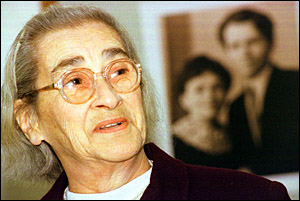 |
 | |||||
|
A Political Act of Volcanic Proportions At the 20th Party meeting, delegates listened as Khrushchev praised communism. He did so, as was the tradition, in an open session of the Congress. There were no surprises. Everything was in order. But within hours, the earth under the USSR would shake. The Soviet Union was born with Vladimir Lenin's communist revolution in 1917. But it was built, with nuts, bolts, and rivers of blood, by Joseph Stalin. Stalin ruled the Soviet Union for more than two decades. Having consolidated power by the late 1920s, he horsewhipped a weary, weather-beaten old empire into an industrialized world power. He led his nation to victory over Nazi Germany. And he created a totalitarian form of governance based on brutality and fear.
It was a tsunami that killed some 20 million people. Yet when Joseph Stalin died, one of the most brutal leaders of the 20th century was entombed with his heroic reputation intact. His people loved him to the end. Everyone knew about the terror. Everyone was afraid. Yet they didn't blame Stalin. They blamed the people around him, his nefarious underlings, the apparatus of government, the informants, the police thugs on the street. "As a kid, I believed that Stalin was like god," says Pavel Litvinov, the grandson of Stalin's foreign minister. Litvinov eventually became a Soviet human rights activist. He recalled what he was taught about Stalin. "That he knew everything in the world, that he was responsible for all good things and couldn't do anything wrong." As a song in praise of Joseph Stalin put it, "Stalin outshines the sun, he flies higher than all, he defeats all enemies, he is our very best friend." It is that love and awe of Joseph Stalin that provided the backdrop for the 20th Communist Party Congress in February 1956. Nikita Khrushchev would burst the hero myth of Stalin to bolster his political fortunes in the succession drama that hovered over the party conference. Khrushchev received help from unexpected quarters: a friend and former superior from the early days of his career. "Aleksei Snegov and Nikita Khrushchev were old comrades from the 1920s in Ukraine," says Taubman. "In 1937, Snegov was arrested and sent to the labor camps near the Arctic Circle. Somehow, he managed to survive until Stalin's death. And after Stalin died, he even managed to smuggle a letter out of the labor camp which reached his old friend Khrushchev in Moscow. Khrushchev summoned Snegov to the Kremlin. "Snegov and Khrushchev had several heart to heart talks after Snegov got back from the camps," says Taubman. Khrushchev was moved by the horrific tales his old comrade told him about life in the camps. Snegov urged Khrushchev to do something about Stalin at the 20th Party Congress. "He told him that if Khrushchev were to let that whole matter to remain secret or to be silent about it that he, Khrushchev, would be engaging in a kind of cover up, and so this kind of argument was one of those that persuaded Khrushchev to make the secret speech," says Taubman.
Continue to part 3 |
